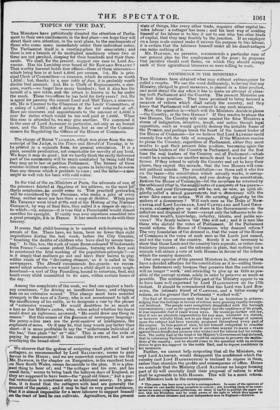r - -- We observe that the ystem of assigning MI - tall
plots of land to . . - cottagers, as :recommended- by Lad SALISBURY, seems to gain' favour in the House ; and we are somewhat surprised to see that I Mr. DAWSON, in the chapter on Emigration, in his excellent book on New South Wales, seems favourable to the plan. It is a plea. ant thing to hear of; and "the cottager and his cow, and his (small farm," seems to bring back the halcyon days of England, as they are supposed to have been—the "good old times ;" but a par- / tial restoration is sometimes only an additional misery. In prac- 4 tide, it is found that the cottagers with land are generally the poorest of the parish; and it may be had on very good testimony, that it as almost impossible for a mere labourer to support himself :!4•11 the tract of land he can cultivate. Agriculture, in the present state of things, like every other" tide, requires 'ether capital be- sides labour : a cottager has none ; and his. beat way of availing himself of his labour is to hire it out to one, who has other kinds of capital, that they may fructify by the junction. If an employer on a large scale cannot make it answer his purpose to hire labour, it is certain that the labourer himself under all his. disadvantages can make nothing of it. . . . Mr. DAWSON, we perceive,, recommends a particular case of our general plan for the employment of the poor: he proposes that parishes should rent. farms, on which they should occupy such of their agricultural labourers as were willing to work.






















 Previous page
Previous page